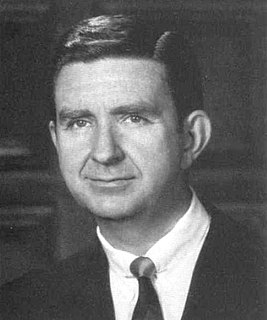A Quote by Marion D. Hanks
The question is not why good people have trials, but how shall good people respond when they are tried?
Related Quotes
Science tries to answer the question: "How?" How do cells act in the body? How do you design an airplane that will fly faster thansound? How is a molecule of insulin constructed? Religion, by contrast, tries to answer the question: "Why?" Why was man created? Why ought I to tell the truth? Why must there be sorrow or pain or death? Science attempts to analyze how things and people and animals behave; it has no concern whether this behavior is good or bad, is purposeful or not. But religion is precisely the quest for such answers: whether an act is right or wrong, good or bad, and why.
Is there an answer to the question of why bad things happen to good people?...The response would be…to forgive the world for not being perfect, to forgive God for not making a better world, to reach out to the people around us, and to go on living despite it all…no longer asking why something happened, but asking how we will respond, what we intend to do now that it has happened.
The key question isn't "What fosters creativity?" But why in God's name isn't everyone creative? Where was the human potential lost? How was it crippled? I think therefore a good question might not be why do people create? But why do people not create or innovate? We have got to abandon that sense of amazement in the face of creativity, as if it were a miracle that anybody created anything.
When people say to me, 'Why are you so good at writing at women?' I say, 'Why isn't everybody?' Obviously there are differences between men and women - that's what makes it all fun. But we're all people. There's a lot of good writers who are very humanist, but still manage to kind of skip fifty-five per cent of the race. And I just don't get that. Not to be able to write an entire gender? To me, the question isn't how do you do it? It's how can you possibly avoid doing it?
But the people at home if we're doing a town meeting or a town format. You have to answer the question that is asked. And what people at home are gauging how does this candidate respond to the questioner? Do they show respect to the questioner? Do they try to understand why the questioner is asking that? Do they respond to the question? Is there a human connection between the two? It's where Barack Obama beat Mitt Romney in 2012. He lost the voters on who was a stronger leader, who had a vision for the future, but on who cares about people like me, he trounced Mitt Romney.
Whatsoever is good for God's children they shall have it, for all is theirs to further them to heaven; therefore, if poverty be good, they shall have it; if disgrace be good, they shall have it; if crosses be good, they shall have them; if misery be good, they shall have it; for all is ours, to serve for our greatest good.
Look at the way celebrities and politicians are using Facebook already. When Ashton Kutcher posts a video, he gets hundreds of pieces of feedback. Maybe he doesn't have time to read them all or respond to them all, but he's getting good feedback and getting a good sense of how people are thinking about that and maybe can respond to some of it.
The History of every major Galactic Civilization tends to pass through three distinct and recognizable phases, those of Survival, Inquiry and Sophistication, otherwise known as the How, Why, and Where phases. For instance, the first phase is characterized by the question 'How can we eat?' the second by the question 'Why do we eat?' and the third by the question 'Where shall we have lunch?
I'm learning a lot how to be good at what I do and also how lucky I am and take it all in and be grateful for all this late in life success I've been having and it's good to have people that have been around and successful for awhile and work with them and see how they behave and it's why they are who they are and why they're still successful.































